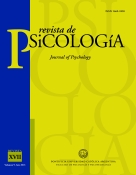Personality and psychological well-being: a study in chilean university student
Keywords:
psychological well-being, personality, gender differencesAbstract
The purpose of the study was to examine the relationship between the Ryff’s multidimensional psychological well-being model and the five-factor model of personality in college students. In order to do this, 315 undergraduate students from the Universidad de Concepción (Chile) completed the Psychological Well-Being Scales and the Big Five Inventory. As predicted, psychological well-being and its dimensions were inversely related to Neuroticism and directly related to the remaining factors. Likewise, it was found that Consciousness and Neuroticism had the highest influence on psychological well-being. Also were found gender differences in Neuroticism, Concientiousness and Agreeableness.Downloads
References
Abbott, R., Croudace, T., Ploubidis, G., Kuh, D., Richards, M. & Huppert, F. (2008). The relationship between early personality and midlife psychological wellbeing: Evidence from a UK birth cohort study. Social Psychiatric and Psychiatric Epidemiology, 43, 679-687.
Ahrens, C. & Ryff, C. (2006). Multiple roles and well-being: Sociodemographic and psychological moderators. Sex Roles, 55, 801-815.
Bardi, A. & Ryff, C. (2007). Interactive effects of traits on adjustment to a life transition. Journal of Personality, 75, 955-983.
Barra, E. (2010). Bienestar psicológico y orientación de rol sexual en estudiantes universitarios, Terapia Psicológica, 28, 119-125.
Barra, E. (2012). Influencia de la autoestima y del apoyo social percibido sobre el bienestar psicológico de estudiantes universitarios chilenos. Diversitas. Perspectivas en Psicología, 8, 29-38.
Chico, E. (2006). Personality dimensions and subjective well-being. The Spanish Journal of Psychology, 9, 38-44.
Contreras, F., Espinosa, J.C. & Esguerra, G. (2009). Personalidad y afrontamiento en estudiantes universitarios. Universitas Psychologica, 8, 311-322.
Cova, F. (2004). Diferencias de género en bienestar y malestar emocional: Evidencias contradictorias. Terapia Psicológica, 22, 165-169.
De Miguel, A. (2005). Diferencias de edad y género en el NEO-PI-R en dos muestras con distinto nivel académico. International Journal of Psychology and Psychological Therapy, 1, 13-31.
Deci, E. & Ryan, R. (2008). Hedonia, eudaimonia, and well-being: An introduction. Journal of Happiness Studies, 9, 1-11.
Díaz, D., Rodríguez-Carvajal, R., Blanco, A., Moreno-Jiménez, B., Gallardo, I. &
Valle, C. (2006). Adaptación española de las escalas de bienestar psicológico de Ryff. Psicothema, 18, 572-577.
Diener, E., Suh, E., Lucas, R. & Smith, H. (1999). Subjective well-being: Three decades of progress. Psychological Bulletin, 125, 272-302.
Eysenck, H. J. (1990). Genetic and environmental contributions to individual differences: The three major dimensions of personality. Journal of Personality, 58, 245-261.
Gómez, V., Krings, F., Bangerter, A. & Grob, A. (2009). The influence of personality and life events on subjective well-being from a life span perspective. Journal of Research in Personality, 43, 345-354.
Grant, S., Langan-Fox, J. & Anglim, J. (2009). The big five traits as predictors of subjective and psychological well-being. Psychological Reports, 105, 205-231.
Hayes, N. & Joseph, S. (2003). Big 5 correlates of three measures of subjective well-being. Personality and Individual Differences, 34, 723-727.
John, O. & Srivastava, S. (1999). The bigfive trait taxonomy: History, measurement, and theoretical perspectives. En L. Pervin & O. John (eds.), Handbook of personality: Theory and research (2nd ed.) (pp. 102-138). New York, EEUU: Guilford.
Keyes, C., Shmotkin, D. & Ryff, C. (2002). Optimizing well-being: The empirical encounter of two traditions. Journal of Personality and Social Psychology, 82, 1007-1022.
Lindfors, P., Berntsson, L. & Lundberg, U. (2006). Factor structure of Ryff’s psychological well-being scales in Swedish female and male white-collar workers. Personality and Individual Differences, 40, 1213-1222.
Linley, P., Maltby, J., Wood, A., Osborne, G. & Hurling, R. (2009). Measuring happiness: The higher order factor structure of subjective and psychological well-being measures. Personality and Individual Differences, 47, 878-884.
Lippa, R. (2010). Sex differences in personality traits and gender-related occupational preferences across 53 nations: Testing evolutionary and social-environmental theories. Archives of Sexual Behavior, 39, 619-636.
McCrae, R. (2002). The maturation of personality psychology: Adult personality development and psychological wellbeing. Journal of Research in Personality, 36, 307-317.
Reid, A. (2004). Gender and sources of subjective well-being. Sex Roles, 51, 617-629.
Rubinstein, G. (2005). The big five among male and female students of different faculties. Personality and Individual Differences, 38, 1495-1503.
Ruini, C., Ottolini, F., Rafanelli, C., Tossani, E., Ryff, C. & Fava, G. (2003). The relationship of psychological well-being to distress and personality. Psychotherapy and Psychosomatics, 72, 268-275.
Ryff, C. (1989). Happiness is everything, or is it? Explorations on the meaning of psychological well-being. Journal of Personality and Social Psychology, 57, 1069-1081.
Ryff, C. & Singer, B. (2008). Know thyself and become what you are: An eudaimonic approach to psychological wellbeing. Journal of Happiness Studies, 9, 13-39.
Schmitt, D., Realo, A., Voracek, M. & Allik, J. (2008). Why can’t a man be more like a woman? Sex differences in big five personality traits across 55 Cultures. Journal of Personality and Social Psychology, 94, 168-182.
Schmutte, P. & Ryff, C. (1997). Personality and well-being: Reexamining methods and meanings. Journal of Personality and Social Psychology, 73, 549-559.
Sheldon, K. & Hoon, T. (2007). The multiple determination of well-being: Independent effects of positive traits, needs, goals, selves, social supports, and cultural contexts. Journal of Happiness Studies, 8, 565-592.
Valle, M., Beramendi, M. & Delfino, G. (2011). Bienestar psicológico y social en jóvenes universitarios argentinos. Revista de Psicología, 7, 7-26.
Van Dierendonck, D. (2005). The construct validity of Ryff’s scales of psychological well-being and its extension with spiritual well-being. Personality and Individual Differences, 36, 629-643.
Van Dierendonck, D., Díaz, D., Rodríguez- Carvajal, R., Blanco, A. & Jiménez, B. (2008). Ryff’s six-factor model of psychological well-being. A Spanish exploration. Social Indicators Research, 87, 473-479.
Vivaldi, F. & Barra, E. (2012). Bienestar psicológico, apoyo social percibido y percepción de salud en adultos mayores. Terapia Psicológica, 30, 23-29.
Wood, A., Joseph, S. & Maltby, J. (2009). Gratitude predicts pychological wellbeing above the big five facets. Personality and Individual Differences, 46, 443-447.
Downloads
Published
How to Cite
Issue
Section
License















